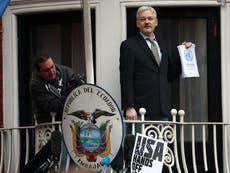The charges Julian Assange now faces in the US will be a marker for how we police our digital age
The Wikileaks founder’s probable extradition raises potentially troubling questions about the role of whistleblowers
The removal of Julian Assange from the Ecuadorian embassy caught many people – including perhaps the man himself – off guard. So long had he been ensconced in the Knightsbridge mansion block with Ecuador’s overseas mission that his presence there seemed an immutable fact of global diplomacy.
Now, however, he is out on his ear, the Ecuadorian ambassador apparently having become fed up with his guest’s messy ways – not to mention the multimillion-pound cost of providing asylum since 2012 to Wikileaks’ controversial founder.
A court in London has already determined Assange guilty of skipping bail – hardly a difficult decision. In Sweden, where he faced two charges of rape and sexual assault, the authorities are said to be monitoring the situation. The rape charge does not lapse officially until next year, although the previously closed investigation would need to be reopened first.
The Swedish charges were what brought Assange to Britain in the first place, convinced as he was that the Swedes would extradite him to America, where he was wanted in connection with Wikileaks’ release of classified documents.
There is an irony that will not escape Assange, that he is likely now to face extradition to the US directly from the UK.
That he is likely not to face justice for his alleged crimes against women is a travesty. Indeed, the ludicrous political circus in which Assange has been cast variously as ringmaster, tightrope walker and clown has regularly pushed others (alleged victims, former supporters and ex-colleagues) to the sidelines in a way that is nauseating.
Repellent though Assange may be, however, his probable extradition to the US does raise potentially troubling questions about the role of whistleblowers in the digital age. After all, while Wikileaks is open to criticism for the way it released vast amounts of unedited material, its actions helped to reveal information that was patently in the public interest (notably about America’s role in Middle East wars).
It is therefore a matter of some importance to know precisely what charges Assange will face in the US – and to consider in the cold light of day what consequences forthcoming legal proceedings might have on justified whistle-blowing and legitimate journalism.
The trouble is that Assange’s bombastic, narcissistic personality makes sober reflections on these important matters less that straightforward.






Join our commenting forum
Join thought-provoking conversations, follow other Independent readers and see their replies